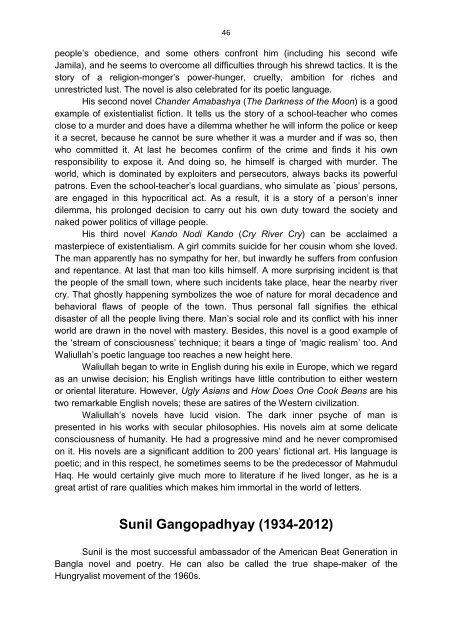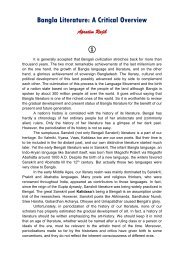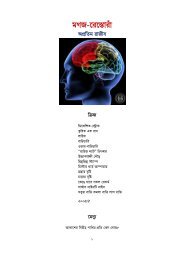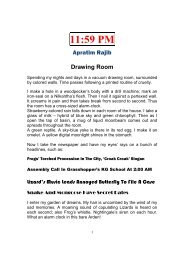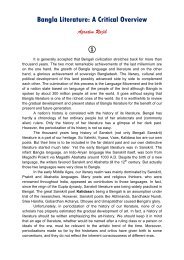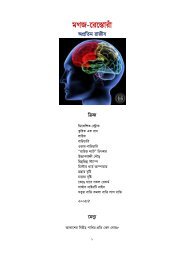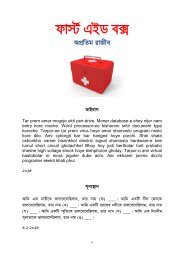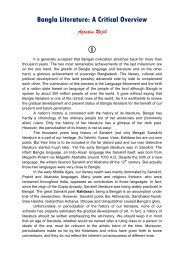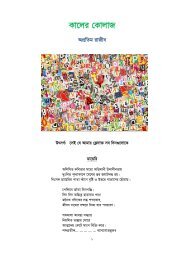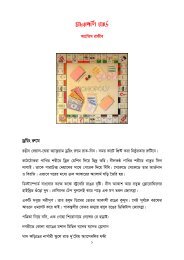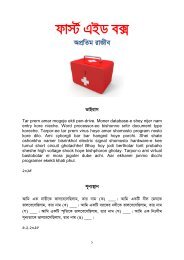BLiterature-Apratim
Create successful ePaper yourself
Turn your PDF publications into a flip-book with our unique Google optimized e-Paper software.
46<br />
people’s obedience, and some others confront him (including his second wife<br />
Jamila), and he seems to overcome all difficulties through his shrewd tactics. It is the<br />
story of a religion-monger’s power-hunger, cruelty, ambition for riches and<br />
unrestricted lust. The novel is also celebrated for its poetic language.<br />
His second novel Chander Amabashya (The Darkness of the Moon) is a good<br />
example of existentialist fiction. It tells us the story of a school-teacher who comes<br />
close to a murder and does have a dilemma whether he will inform the police or keep<br />
it a secret, because he cannot be sure whether it was a murder and if was so, then<br />
who committed it. At last he becomes confirm of the crime and finds it his own<br />
responsibility to expose it. And doing so, he himself is charged with murder. The<br />
world, which is dominated by exploiters and persecutors, always backs its powerful<br />
patrons. Even the school-teacher’s local guardians, who simulate as `pious’ persons,<br />
are engaged in this hypocritical act. As a result, it is a story of a person’s inner<br />
dilemma, his prolonged decision to carry out his own duty toward the society and<br />
naked power politics of village people.<br />
His third novel Kando Nodi Kando (Cry River Cry) can be acclaimed a<br />
masterpiece of existentialism. A girl commits suicide for her cousin whom she loved.<br />
The man apparently has no sympathy for her, but inwardly he suffers from confusion<br />
and repentance. At last that man too kills himself. A more surprising incident is that<br />
the people of the small town, where such incidents take place, hear the nearby river<br />
cry. That ghostly happening symbolizes the woe of nature for moral decadence and<br />
behavioral flaws of people of the town. Thus personal fall signifies the ethical<br />
disaster of all the people living there. Man’s social role and its conflict with his inner<br />
world are drawn in the novel with mastery. Besides, this novel is a good example of<br />
the ‘stream of consciousness’ technique; it bears a tinge of ‘magic realism’ too. And<br />
Waliullah’s poetic language too reaches a new height here.<br />
Waliullah began to write in English during his exile in Europe, which we regard<br />
as an unwise decision; his English writings have little contribution to either western<br />
or oriental literature. However, Ugly Asians and How Does One Cook Beans are his<br />
two remarkable English novels; these are satires of the Western civilization.<br />
Waliullah’s novels have lucid vision. The dark inner psyche of man is<br />
presented in his works with secular philosophies. His novels aim at some delicate<br />
consciousness of humanity. He had a progressive mind and he never compromised<br />
on it. His novels are a significant addition to 200 years’ fictional art. His language is<br />
poetic; and in this respect, he sometimes seems to be the predecessor of Mahmudul<br />
Haq. He would certainly give much more to literature if he lived longer, as he is a<br />
great artist of rare qualities which makes him immortal in the world of letters.<br />
Sunil Gangopadhyay (1934-2012)<br />
Sunil is the most successful ambassador of the American Beat Generation in<br />
Bangla novel and poetry. He can also be called the true shape-maker of the<br />
Hungryalist movement of the 1960s.


